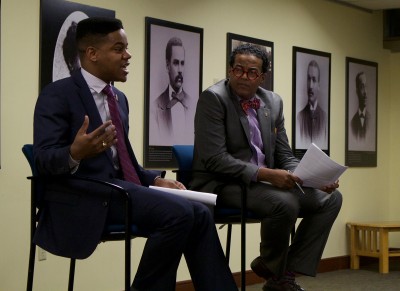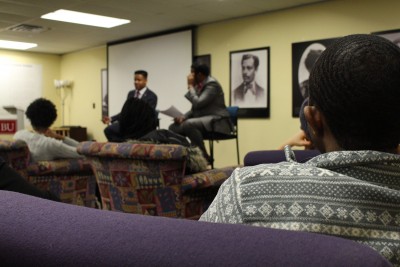
Martese Johnson, an African-American senior at the University of Virginia who was attacked by police, shared his experience with the Boston University community as a Black Lives Matter movement activist. Johnson emphasized the important role social media plays in the modern civil rights movement.
Johnson was “assaulted and violently arrested by liquor control agents outside of a campus bar” on March 2015, according to the gathering’s Facebook page. The YouTube video of his arrest received more than one million views and had sparked “public outrage and protests.”
UMOJA: BU Black Student Union and the Chi Chapter of Kappa Alpha Psi Fraternity co-hosted the dialogue in the Howard Thurman Center for Common Ground. Approximately 50 BU students and professors attended the free gathering.
The conversation started with Johnson’s speech. He talked about his childhood, adulthood, the “UVA incident” and the way social media users responded to the incident. Growing up in a low-income neighborhood of South Chicago, getting into the university was an accomplishment, Johnson said.
“I found role models at organizations which geared towards the development of young black men in Chicago,” John said during his speech. “[In these organizations], I was given the necessary tools to matriculate at a top-tier university, something that nobody in my family has achieved.”
Johnson said as a student at UVA, he felt the pressure to assimilate with white culture to be accepted by his peers.
“I joined predominantly white organizations, I learned the social norms [of being white] and I changed my wardrobe,” Johnson said in his speech. “Eventually, I reaped the benefits of reframing my blackness into something that was more acceptable to the white majority.”

Following Johnson’s speech, Keith Magee, a reverend and former visiting researcher at BU, carried a conversation with Johnson in which they talked about the role of social media in the Black Lives Matter movement.
When Magee asked what Johnson had planned for the future, Johnson said he wished to advocate for more African Americans in the political arena.
“We need more African Americans in positions that would allow us to change policy,” Johnson said responded. “I do want to run for mayor.”
Attendees had the chance to address Johnson with questions during the following Q&A session. When asked what could be done to improve public policy, Johnson replied that the African-American community needs to work together with policy makers.
“Often times, I feel our community can be very cliquish,” Johnson said. “When we do things such as creating these divisions and cutting off communication, we are hurting ourselves.”
Closing the conversation, Johnson said he appreciated the passionate atmosphere surrounding the gathering.
“I loved BU,” Johnson said. “I really am impressed with the students, and the fact they were so attentive and engaged and so concerned. I’ve spoken at a lot of predominantly white universities, and sometimes you get students who are less knowledgeable and a bit ambivalent about the conversation.”
Several attendees said the conversation was a valuable experience, and they would reflect on what Johnson said about African-American movements.
Jamal Adan, a member of UMOJA and an organizer of the gathering, said the conversation was a bigger success than he hoped.
“It was a really good turnout,” Adan, a junior in the Frederick S. Pardee School of Global Studies, said. “There [were] more people than we expected to show up.”
Adan also commented on the university’s stand on diversity. He said while it looks good on paper, the stand is “shaky” in reality.
“When [university staff members] talk about diversity, they show all these black students on fliers and brochures,” Adan said. “But when African-American students attend this school, they don’t have a community. We are always looking for fellowship or somebody that can support us.”
Zoe Nwabunka, a senior in the College of Arts and Sciences, said the African-American community is exclusive because of the history of segregation, adding that this attitude needs to change.
“Martese gave a great opinion about how blacks are a very exclusive group of people and that we need to include other races in our things,” Nwabunka said.
Tyrone Porter, a professor in the College of Engineering, said he was glad the BU community had the opportunity to hear from someone with a firsthand experience of severe racism.
“It is Black History Month,” Porter said. “Having someone who has actually experienced racism and police brutality, who has been part of Black Lives Matter movement come here and speak to the students has been definitely a powerful thing.”












































































































